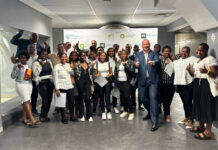By Yershen Pillay, CEO of the Chemicals Industries Education and Training Authority (CHIETA)
MORE than three million South Africans lack access to essential water, and 19% of rural communities in South Africa do not have access to a reliable water supply. An estimated 26% of our schools face severe water supply challenges, and only 23% of our municipalities achieved good capacity scores for effective water management.
Economic forecasts indicate that water demand in 2030 could exceed supply by 10%. Given the grim picture painted by the data, how do we address the water problem and end water poverty? As we observe World Water Day, this is a crucial question for the chemical industry and society.
As a skills and training authority, CHIETA is committed to providing the requisite skills needed to change the narrative through our initiative to create “wantrepreneurs”. We want to explore partnerships on clean water harvesting to ensure that South Africa is not left behind.
The escalating water crisis requires immediate action by all stakeholders in society. A root cause analysis points to failing municipal infrastructure, climate change leading to changing rainfall patterns, and the lack of innovative solutions as possible causal factors.
South Africa needs an innovation-driven strategy focusing on novel water security solutions. Five innovation-driven solutions can be considered. First, new technologies can help us achieve water independence for all.
This requires deliberate leveraging of digital and green technologies for more effective water management. We need more significant investments in new water technologies, such as climate-resilient water systems that will assist us in ending water poverty and meeting our sustainability goals.
Second, a concerted effort to mainstream water as a circular resource with more incentives for firms who treat and recycle water in their businesses. Businesses need to see what’s in it for them before they commit to sustainable water practices.
Our current water infrastructure is unable to distribute value to citizens. Poor water infrastructure is often the most visible sign of water poverty. From an innovation perspective, we should not push water infrastructure into communities but provide an enabling environment where local economic development is forced to “pull” water infrastructure into communities.
The fourth strategic intervention is to adopt innovative pull strategies, such as investing in new skills for effective water management. This is far more effective at triggering sustainable water development and facilitating water security for all. This is the role of a highly qualified and competent water engineer. By closing the skills gap in water management, the country could position itself as a global leader in producing high-quality water-related skills for the international market.
During a recent lecture by Professor Omar Yaghi, a global expert in reticular chemistry, new research on clean water production was explored in detail. Reticular chemistry is the science of linking molecules using strong bonds and may provide sustainable solutions to clean water production. With over 30 years of research, Yaghi has demonstrated how metal-organic frameworks (MOFs) are driving advancements in clean water production in various parts of the world.
There is more water in the air than in all rivers and dams in the world. Professor Yaghi and his team have developed MOF water harvesters that can harvest water from the air. This exciting and useful technology produces ultra-pure, distilled water, with the MOF acting as a molecular filter. Imagine the possibilities of every rural community having an independent water harvester at their doorstep!
The fifth strategic intervention for facilitating water security is to adopt independent water harvesting from the air using research from the field of reticular chemistry.















